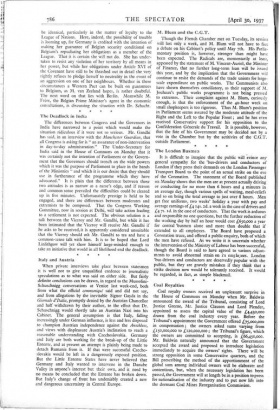Italy and Austria When private interviews take place between statesmen
it is well not to give unqualified credence to journalistic speculations as to what was said on either side. But fairly definite conclusions can be drawn, in regard to the Mussolini- Schuschnigg conversations at Venice last week-end, both from what the official communiqué said and did not say, and from allegations by the inevitable Signor Gayda in the Giornale d'Italia, promptly denied by the Austrian Chancellor and half withdrawn by their author, to the effect that Dr. Schuschnigg would shortly take an Austrian Nazi into his Cabinet. The general assumption is that Italy, falling increasingly under German influence, is less and less disposed to champion Austrian independence against the Anschluss, and views with displeasure Austria's inclination to reach a reasonable understanding with Czechoslovakia. Germany and Italy are both working for the break-up of the Little Entente, and at present an attempt is plainly being made to detach Rumania from it. If that were successful Czecho- slovakia would be left in a dangerously exposed position. But the Little Entente States have never believed that Germany and Italy wanted to intervene in the Danube Valley in anyone's interest but their own, and it need by no means be concluded that the Entente has broken down. But Italy's change of front has undeniably created a new and dangerous uncertainty in Central Europe.


































































 Previous page
Previous page